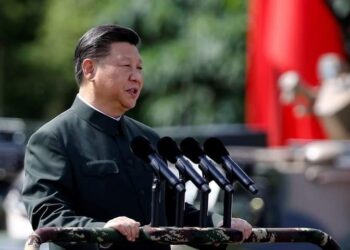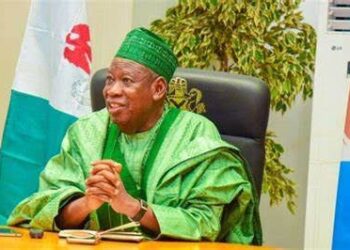It was the famous Indian nationalist and father of non-violence resistance, Mahatma Gandhi, who identified the seven deadly sins that is destroying humans: “Wealth without work, Pleasure without conscience, Science without humanity, Knowledge without character, Politics without principle, Commerce without morality, Worship without sacrifice.”
Ghandi brings us to the baseline, reminding us that nothing is without its proper balance. Wealth should be earned through work; pleasure should be enjoyed responsibly; science must regard the feelings and fate of individuals, and politics must be conducted with principle. The foregoing is responsible for corruption in Nigeria.
Renewed Hope, as President Bola Ahmed Tinubu’s roadmap for redeeming Nigeria is christened, faces litmus test as the administration assembles what could best be described as the mother of all cabinets. However, one inevitable reality that faces the new administration are the twin monster called corruption and internet fraud.
As well trained corruption analyst who has attended so many international security and anti-corruption conferences, I most sincerely appreciate the credible decisive actions take by President Tinubu, including the big stick he wielded in the Economic and Financial Crimes Commission (EFCC) recently. But he must not stop there on the commission. He must ensure that all past records of how the ant-graft agency has been run must be made known to the public as being practiced across the globe.
These deadly poison called corruption has prevented the Foreign Direct Investment (FDI) drives of previous administrations from achieving the lofty ideals of attracting investment, thereby creating jobs and the attendant tax earnings.
Internet fraud has continued to smear the image of Nigerians in the international circle. It has continued to deny genuine businessmen/women of viable investment opportunities as most genuine business people are deemed to be fake and fraud stars.
Corruption, on the other hand, has kept the Giant of Africa on its knees and its citizens perpetually leaving in penury. Corruption is so bad that the United Nations described it as one of the most insidious social phenomena that erodes trust in public institutions, hinders economic development and has a disproportionate impact on the enjoyment of human rights, particularly by people that belong to marginalised or disadvantaged groups such as minorities, people with disabilities, refugees, migrants and prisoners. It also disproportionately affects women, children and people living in poverty, in particular by hampering their access to basic social rights such as healthcare, housing and education.
Corruption is an anti social attitude awarding improper privilege’s contrary to legal and moral norms and impairs the authorities, capacity to secure the welfare of all citizens.
The potential causes of corruption in government is greed, avarice, higher level of market and political monopolization, low level of democracy, weak civil participation, low level of political transparency, high level bureaucracy and in inefficient administrative structures.
These sad state of affairs not withstanding, the president has given Nigerians something to share, when he vowed that his administration would make Corruption less attractive. This direction is a soothing relief because the task of fixing Nigeria will remained a mirage until corruption is reduced to the barest minimum.
For President Tinubu, fighting corruption is not negotiable as his Renewed Hope mantra will only be a pipe dream if the corruption concern is not adequately addressed. However, one thing that’s critical is the best method to be adopted in the anti corruption drive. Do we allow corrupt acts to take place before we arrest and engage in endless prosecution with attendant outrageous legal cost or we deploy technology in the conduct of government business that will narrow channels of corruption?
Corruption is a global phenomenon because it is in human nature to be greedy. However, the difference with advanced society like the United States, Canada, United Kingdom and most European countries have adopted technology as a means of transacting government business. Hence, it is easy to monitor operations because, with technology, encumbrances are less. Tinubu can learn from the advanced society. Though he is not entirely new to the use of technology in government business. As Lagos State governor, Tinubu modernised through technology the working of government.
Another potent ways to contain corruption menace is to expose corrupt activities and risk, keep the public sector honest, transparent and accountable, stop dishonest practices, ensure public sector employee’s act in the public interest. Beside this, the heavy reliance on technology as a means of doing government business will go along way in narrowing sleaze channels. In my opinion, if Tinubu is to succeeds in reducing corruption he should create a central vigilance bureau through various options, orders and circulars, recommended adoption of integrity pact to all organisations in major procurement activities and to effective expendition intelligence investigation were ever any irregularity, misconduct is noticed by the Law.
Other ways the Tinubu-led government can combat corruption is by promoting good governance, strengthning regime to prevent corruption and bringing corrupt actors to justice. Enhanced international cooperation and partnerships, recognise reforms, leverage coordinaion. The full weight of the law must be brought against those in positions of authority, who have been found to abuse their offices.
Tinubu must ensure that dishonest or fraudulent conducts by those in power are punished by productive prosecution. They must have their days in court to serve as deterrent to others.
On the causes of Internet Fraud activities, especially by Young people who are mostly students below the age of 25, Tinubu will need to redouble its efforts. How can it be explained that a young man of 25 or less wants to be a multi-milionaire through nefarious activities on the internet? The kids go as far as involving in human sacrifices to promote their trade.
This has been blamed on the preoccupation of get-rich-quick syndrome in our society. This menace has become a major factor impeding economic development. The get-rich-quick syndrome has become one of the real-time contemporary social problems of Nigerian society.
The culture of quick fixes or shortcuts that is prevalent among youths is unlawful, unreasonable, untenable and even ungodly. Alas, the Nigerian youths are no longer interested in earning money through the legitimate and honourable way, which is one of the major reasons for present economic decline.
Other crimes like armed robbery, political thuggery, kidnapping, ritual killings and others are the product of the get-rich-quick maliase The society that ought to query the source of their wealth ends up celebrating them. We live in a time where a child can afford to buy houses or cars for parents without the moral stand of those parents to query the sources of the stupendous wealth. This desperation by our youths to survive at all costs is dangerous, devastating and pathetic. It poses a serious threat to the Nigerian society, particularly the upcoming generation, if the trend is not urgently addressed.
The Tinubu led administration must embark on massive value reorientation by empowering State institutions like the National Orientation Agency. The need to teach our future generations the value of hardwork is crucial to taming the tide Internet Fraud. Through this menace, Nigerians have continued lose their hard earned resources to the activities of fraud stars. In times past, our forebears had the value of patients. But today, a 20-year-old young man wants drive Ferrari.
– Ibrahim is director, Communications and Strategic Planning, of the Presidential Support Committee (PSC).




